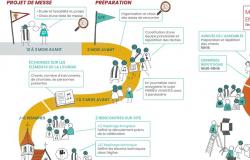The energy performance diagnosis (DPE) has been an integral part of the French real estate landscape for years. But beware, owners: a big upheaval is on the horizon. From 2025, this mandatory document for the sale or rental of real estate will no longer be free.
This new situation will impact many owners, whether they are landlords or sellers. What are the ins and outs of this reform? What are the consequences for your wallet and your property?
Deciphering the issues and future changes.
The DPE: an essential tool in real estate
Before discussing the upcoming changes, it is crucial to understand the importance of DPE in the French real estate sector.
What is ECD?
The Energy Performance Diagnosis is a document that evaluates two key aspects of a home:
- Its energy consumption
- Its greenhouse gas emissions
These evaluations make it possible to assign a energy label to housing, ranging from A to G. A represents excellent energy performance, while G indicates very poor performance.
The importance of ECD in the ecological transition
The DPE plays a central role in the ecological transition of the French real estate stock. By providing a clear and standardized assessment of the energy performance of homes, it encourages:
- Owners to undertake energy renovation work
- Buyers and tenants to choose more energy-efficient housing
- General awareness of the environmental impact of housing
The 2021 reform: a turning point for the DPE
Before discussing the changes planned for 2025, it is important to review the major reform which took place in July 2021.
More reliable calculation methods
This reform introduced new calculation methods for the DPE, aiming to make it more reliable et representative of the energy reality of housing. These changes have had significant repercussions:
- A reassessment of numerous housing units
- Better consideration of the specificities of each property
- Limited validity for old diagnoses
The expiration of old DPE
A crucial point of this reform concerns the validity of old diagnoses. All DPEs carried out between January 1, 2018 and July 1, 2021 will only be valid until December 31, 2024. This decision will have major consequences in 2025, as we will see later.
2025: the year of big change
The year 2025 will mark a turning point in the history of ECD in France. Several major changes will come into effect, directly impacting owners.
DPE becomes chargeable
The main novelty is that the DPE will become chargeable from 2025. This decision will have financial repercussions for owners:
- A planned increase of 15% in the average price of DPE
- An estimated cost between 120 and 300 euros depending on the accommodation
- Price variations depending on the size and complexity of the property
Millions of owners affected
Due to the expiration of old diagnostics mentioned above, million owners will have to have a new DPE carried out in 2025. This concerns all those whose diagnosis was carried out between the beginning of 2018 and mid-2021.
The implications for owners
Faced with these changes, owners must prepare and anticipate several aspects.
Impact financier
The cost of the DPE will represent a new expense to be included in the owners’ budget. It will be necessary to plan:
- The cost of the diagnosis itself (between 120 and 300 euros)
- Any additional costs (travel of the diagnostician, etc.)
- A budget for possible work if the diagnosis proves unfavorable
Planning and organization
Owners will have to anticipate the creation of the new DPE:
- Check the validity date of their current DPE
- Make an appointment with a certified diagnostician
- Prepare the necessary documents (energy bills, plans, etc.)
The challenges for the real estate market
These changes will have repercussions on the entire French real estate market.
Impact on transactions
The DPE being compulsory for any sale or rental, its paid nature could influence:
- The timing of sales or rentals
- Price negotiations (the cost of the DPE could be passed on)
- The speed of transactions (additional time to obtain the diagnosis)
Evolution of the real estate stock
In the longer term, these changes could accelerate the transformation of the French real estate stock:
- Increased incentive for energy renovation
- Potential devaluation of less efficient properties
- Increase in value of well-rated housing
Focus on small areas
The reform of the DPE will have particular implications for owners of small premises.
Reclassification of housing
An unexpected consequence of the reform is the reclassification of certain small dwellings :
- Around 140,000 homes of less than 40 m² should be reclassified
- These homes represent 15% of properties classified F and G in France
- They will fall out of the category of “thermal strainers”
Implications for landlords
This reclassification will have positive consequences for certain owners:
- Possibility of continuing to rent properties previously considered energy-intensive
- Avoidance of costly renovation work for these small areas
- Maintaining these accommodations in the rental stock
Preparing for the future: advice for owners
Faced with these changes, owners can adopt several strategies to best adapt.
Anticipate and diagnose
It is recommended not to wait until 2025 to act:
- Check the validity date of your current DPE now
- Plan to carry out a new diagnosis if necessary
- Budget this expense to avoid unpleasant surprises
Consider renovation work
If your property risks obtaining a poor rating, it may be wise to anticipate:
- Carry out an energy audit to identify weak points
- Plan energy improvement work
- Find out about the financial aid available for this work
Help available for owners
Faced with these new expenses, it is important to know the assistance to which you are eligible.
Aid for energy renovation
Several schemes exist to finance energy improvement work:
- MaPrimeRénov’: state aid accessible to all owners
- The zero-rate eco-loan: an interest-free loan to finance your work
- Energy Savings Certificates (EEC): bonuses paid by energy suppliers
Local aid
Don’t forget to find out about aid specific to your region or municipality:
- Subsidies from local authorities
- Aid from Departmental Housing Information Agencies (ADIL)
- Systems put in place by certain intercommunal authorities
The environmental impact of the new DPE
Beyond the financial and practical aspects, it is important to consider the environmental impact of this reform.
Towards better energy efficiency
The new DPE should contribute to improving the energy efficiency of the French real estate stock:
- Stronger incentive for energy renovation
- Better information for buyers and tenants
- Increased awareness of energy issues in the home
Reduction of greenhouse gas emissions
Ultimately, these changes should have a positive impact on the environment:
- Reduction in energy consumption of homes
- Reduction of CO2 emissions linked to housing
- Contribution to achieving France’s climate objectives
The challenges ahead
Despite the potential benefits, implementing the new paid ECD raises challenges.
Financial accessibility
The cost of the DPE could pose a problem for some owners:
- Risk of postponement of sales or rentals for the most modest
- Need to put in place aid for the most precarious owners
- Possible impact on the old real estate market
Market adaptation
The real estate sector as a whole will have to adapt:
- Training of professionals to new standards
- Adjustment of real estate agency practices
- Possible evolution of the choice criteria of buyers and tenants
The move to a paid DPE in 2025 represents a major change for French owners. Between additional costs, new obligations and potential opportunities, this reform will reshape the real estate landscape in the years to come. Savvy owners will anticipate these changes to transform this constraint into an opportunity to improve their real estate assets.






